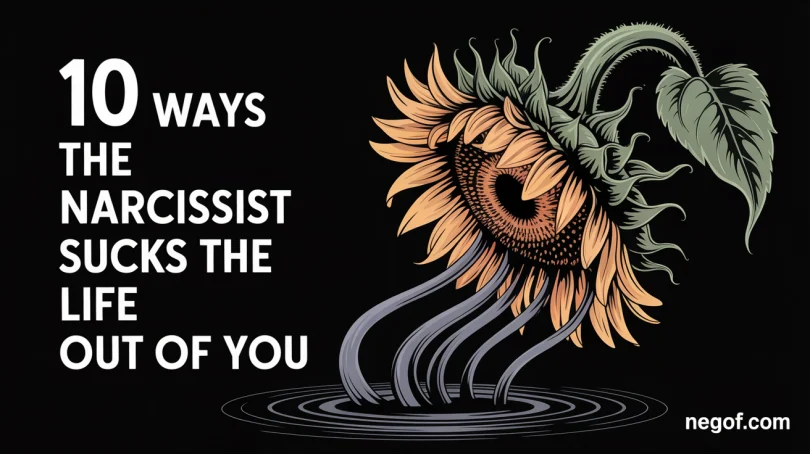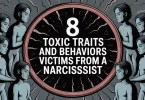Dealing with a narcissist is like running a marathon with no finish line. Their behaviors wear you down, leaving you emotionally and physically exhausted. Here are 10 ways they drain your energy and how to spot their tactics.
1. Constant Arguing with No Resolution
Narcissists thrive on conflict. Every conversation turns into a battle, with nothing ever resolved. They’ll contradict you endlessly if you say something is red; they’ll insist it’s green. If you try to hold them accountable, they’ll flip the blame onto you. This relentless back-and-forth leaves you mentally drained, as you’re stuck in a cycle of arguing with no end.
How to Spot It: Notice if discussions always escalate into fights or if they refuse to acknowledge your perspective.
2. Gaslighting and Confusion
Narcissists are masters of gaslighting, using phrases like “I don’t remember that,” “It didn’t happen that way,” or “You’re crazy” to distort your reality. This creates brain fog, making you doubt your memory and judgment. You might start questioning whether you’re the problem, which is exactly what they want. The resulting confusion exhausts your mind as you struggle to separate truth from their lies.
How to Spot It: Pay attention to moments when they deny events you clearly remember or accuse you of being delusional.
Related Topics:
3 Clues to Spot a Malignant Narcissist in Conversation
How To Make A Narcissist Feel Sorry For Everything?
3. Cognitive Dissonance
Gaslighting leads to cognitive dissonance, where you’re torn between what you know is true and the false narrative the narcissist pushes. This mental tug-of-war tires your brain, as you’re constantly trying to reconcile two versions of reality. Over time, this mental exhaustion spills over, affecting your physical energy too.
How to Spot It: You feel mentally foggy or second-guess your instincts after interactions with them.
4. Anxiety and Hyper-Vigilance
Narcissists create an environment of fear and uncertainty. You’re always on edge, worrying about their reactions or criticism. This constant state of anxiety keeps your body in hyper-alert mode, making it impossible to relax. The stress of walking on eggshells drains your energy and leaves you a bundle of nerves.
How to Spot It: You feel nervous or paranoid about saying or doing the wrong thing around them.
5. Depression and Hopelessness
Narcissists project their inner turmoil onto you, often through devaluation and criticism. They might belittle your appearance, achievements, or behavior, eroding your self-worth. This can spiral into depression, where you feel unmotivated, cancel plans, or struggle to get out of bed. Depression is subtle but devastating, sapping your energy and leaving you feeling hopeless.
How to Spot It: You notice a lack of joy, low energy, or feelings of worthlessness after their put-downs.
6. Emotional Loneliness
Narcissists often start charming but turn cold over time. They may ignore you, focus on their phone, or act distant, leaving you feeling unloved and alone in the relationship. This emotional neglect creates a deep sense of loneliness, which is exhausting as you yearn for a connection that never comes.
How to Spot It: You feel isolated even when you’re physically with them, or they dismiss your need for affection.
7. Crying and Weakened Immunity
The confusion, loneliness, and criticism from a narcissist can lead to frequent crying, which takes a toll on your physical health. Emotional distress weakens your immune system, making you more susceptible to illnesses like colds. While it’s important to release emotions, the constant upset caused by a narcissist wears down your body.
How to Spot It: You’re frequently tearful or notice physical symptoms like fatigue or illness after emotional conflicts.
8. Turning You into a Detective
Narcissists’ secrecy and deceit force you into detective mode. You might feel compelled to check their phone, social media, or even track their whereabouts to uncover the truth. This obsessive need to verify their actions is exhausting and a clear sign you’re in a toxic relationship. Trust your gut if you feel the need to investigate; something’s likely wrong.
How to Spot It: You’re constantly monitoring their behavior or feel suspicious about their honesty.
9. Dragging You Through Court
If you’re divorcing a narcissist, they’ll often prolong legal battles to torture you. They’d rather pay their lawyer than settle quickly, especially if you left them. This endless cycle of court appearances drains your time, money, and emotional energy, leaving you depleted.
How to Spot It: They refuse to compromise during legal proceedings or use the court as a way to control you.
10. Needing Constant Attention
Narcissists demand endless validation and attention. You’re forced to flatter them, agree with them, or tiptoe around their moods to avoid their silent treatment or criticism. This constant effort to keep them happy is exhausting, as you can never be yourself. In a healthy relationship, you should feel free to be authentic without fear of backlash.
How to Spot It: You feel like you’re always catering to their ego or walking on eggshells to avoid conflict.
The Bigger Picture: How This Affects Your Health
The chaos caused by a narcissist’s arguing, gaslighting, anxiety, and depression creates a state of chronic stress. This high cortisol level can lead to serious health issues like stomach problems, thyroid issues, high blood pressure, or even hair loss. Mental stress doesn’t just tire you out; it can break down your physical health over time. In extreme cases, the despair can lead to suicidal thoughts, which is why recognizing these patterns is critical.
How to Protect Yourself
To break free from a narcissist’s draining influence, take these steps:
- Educate Yourself: Learn about narcissistic behaviors and gaslighting phrases to spot their tactics. Knowledge is power.
- Stay Grounded: When they try to gaslight you, affirm your reality. Say to yourself, “I know the truth, and I’m not falling for this.”
- Seek Support: Therapy can help you process the trauma and rebuild your self-worth. Talking to trusted friends or support groups also provides clarity.
- Prioritize Self-Care: Exercise, meditation, or even a simple walk can combat anxiety and depression. Human connection is vital; spend time with positive people who lift you.
- Trust Your Discernment: Vet people carefully before letting them into your life. Not everyone is toxic, but use your instincts to avoid those who are.
- Set Boundaries: Limit contact with the narcissist if possible, and don’t engage in their games. Your peace is worth protecting.
Narcissists suck the life out of you by creating chaos, confusion, and emotional turmoil. But you don’t have to stay in their black hole. Recognize their tactics, reclaim your power, and surround yourself with people who bring you peace and authenticity. You deserve relationships that energize you, not drain you.







Leave a Comment